Ditapis dengan
E-book Safe and Dignified Burial : An Implementation Guide for Field Managers
The general term ‘infectious disease’ is used to describe illnesses that are caused by pathogenic microorganisms, such as bacteria, viruses, parasites, or fungi, that can spread, directly or indirectly, from one person to another. Some infectious diseases cause life-threatening illnesses that have high mortality rates. They can present a serious hazard to those who care for the sick, at ho…
- Edisi
- -
- ISBN/ISSN
- -
- Deskripsi Fisik
- 133 hlm
- Judul Seri
- -
- No. Panggil
- 613.6 EAR s
E-book Wildfire Smoke : A Guide for Public Health Officials
Wildfire smoke events can occur without warning – but we can be prepared. This Guide is intended to provide state, tribal, and local public health officials with information they need to be prepared for smoke events and, when wildfire smoke is present, to communicate health risks and take measures to protect the public. Although developed for public health officials, the information in this d…
- Edisi
- -
- ISBN/ISSN
- -
- Deskripsi Fisik
- 88 hlm
- Judul Seri
- -
- No. Panggil
- 613.6 STO w
E-book A Holter for Parkinson’s Disease Motor Symptoms : STAT-On
Parkinson’s disease (PD) is the second most frequent neurodegenerative disorder, with approximately 6.1 million people who live with PD in 2016 worldwide [1]. For several reasons that are not yet fully understood, the prevalence and incidence are expected to increase in the next years. According to the World Health Organization, globally, disability and death due to PD …
- Edisi
- -
- ISBN/ISSN
- 9781032632865
- Deskripsi Fisik
- 269 hlm
- Judul Seri
- -
- No. Panggil
- 610 AVI a
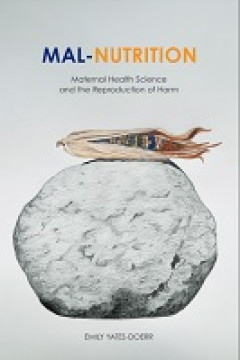
E-book Mal-Nutrition: Maternal Health Science and the Reproduction of Harm
Mal-Nutrition documents how maternal health interventions in Guatemala are complicit in reproducing poverty. Policy makers speak about how a critical window of biological growth around the time of pregnancy—called the ""first 1,000 days of life""—determines health and wealth across the life course. They argue that fetal development is the key to global development. In this thought-provoking…
- Edisi
- -
- ISBN/ISSN
- 9780520404427
- Deskripsi Fisik
- 270 halaman, ilus.
- Judul Seri
- -
- No. Panggil
- 618.2 YAT m
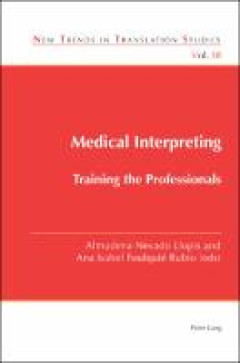
E-book Medical Interpreting: Training the Professionals
«This comprehensive, insightful and well-researched work is an essential and timely contribution to sustaining the training of healthcare interpreters. It provides an important foundation for trainers, researchers and practitioners, based on a thorough and up-to-date reflection on the challenges and needs of healthcare interpreting today, and on the development of training materials for interp…
- Edisi
- -
- ISBN/ISSN
- 9781800793224
- Deskripsi Fisik
- 268 halaman
- Judul Seri
- -
- No. Panggil
- 362.1068 LLO m
E-book Misery to Mirth : Recovery from Illness in Early Modern England
The history of early modern medicine often makes for depressing reading. It implies that people fell ill, took ineffective remedies, and died. A few snippets from Roy and Dorothy Porter’s classic study, In Sickness and in Health, encapsulate this pes-simism: they speak of the ‘universal sickness, suffering, and woe’ of the early mod-ern past, a time in which ‘people died like f…
- Edisi
- -
- ISBN/ISSN
- 9780198779025
- Deskripsi Fisik
- 287 hlm
- Judul Seri
- -
- No. Panggil
- 610 NEW m
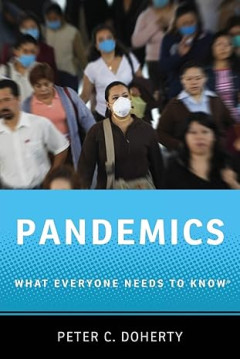
E-book Pandemics: What Everyone Needs to Know®
In Pandemics: What Everyone Needs to Know®, Peter Doherty, who won the Nobel Prize for his work on how the immune system recognizes virus-infected cells, offers an essential guide to one of the truly life-or-death issues of our age. In concise, question-and-answer format, he explains the causes of pandemics, how they can be counteracted with vaccines and drugs, and how we can better prepare fo…
- Edisi
- -
- ISBN/ISSN
- 9780199898121
- Deskripsi Fisik
- 268 halaman
- Judul Seri
- -
- No. Panggil
- 613.6 DOH p
E-book A Guide to Risk Management of Cultural Heritage
Heritage managers and caretakers often have to prioritize and make choices about how best to use the available resources to protect collections, buildings, monuments and sites. This means, for instance, having to decide among options such as increasing security against theft and vandalism, improving building maintenance to reduce water leaks, installing air conditioning in collection storage ar…
- Edisi
- -
- ISBN/ISSN
- -
- Deskripsi Fisik
- 118 hlm
- Judul Seri
- -
- No. Panggil
- 613.6 JUN a

E-book Imagining Chinese Medicine
While at medical school in north China during the sec-ond Sino-Japanese war (1936–45), Professor Ma chose to specialise in traditional medicine. As a medical graduate in revolutionary China, he was then allocated a position teaching physiology in Peking Medical College (Beiyi Xueyuan ????), which allowed him ample time for reading the medical classics, a pursuit that he found suited him bette…
- Edisi
- -
- ISBN/ISSN
- 9789004366183
- Deskripsi Fisik
- 542 hlm
- Judul Seri
- -
- No. Panggil
- 610.51 BAK i

E-book Ikigai: The Japanese Secret to a Long and Happy Life
Bring meaning and joy to all your days with this internationally best-selling guide to the Japanese concept of ikigai - the happiness of always being busy - as revealed by the daily habits of the world's longest-living people. "Only staying active will make you want to live a hundred years." (Japanese proverb) According to the Japanese, everyone has an ikigai - a reason for living. And ac…
- Edisi
- -
- ISBN/ISSN
- 9781524704551
- Deskripsi Fisik
- 123 halaman
- Judul Seri
- -
- No. Panggil
- 613 GAR i
E-book Medicine and Memory in Tibet : Amchi Physicians in an Age of Reform
Under a clear autumn sky, Amchi Yonten Tsering and I were chat-ting in his Shigatse courtyard in the morning sun when the first patient of the day knocked on the front door. An elderly monk was let inside, accompanied by a younger colleague. We exchanged a few words and found out they were from nearby Tashilhunpo Monastery, the seat of the reincarnated line of the Panc…
- Edisi
- -
- ISBN/ISSN
- 9780295743004
- Deskripsi Fisik
- 308 hlm
- Judul Seri
- -
- No. Panggil
- 610 HOF m
E-book Health Taxes : Policy And Practice
Virtually all fiscal measures can (or have the potential to) influence people’s health, through shaping behaviour, consumption, income and wealth. A subset of fiscal measures, however, can be identified as more directly linked to improving health by targeting behaviours and risks that are known to be strongly associated with health outcomes. Some of these measures, which we define as ‘healt…
- Edisi
- -
- ISBN/ISSN
- 9781800612396
- Deskripsi Fisik
- 529 hlm
- Judul Seri
- -
- No. Panggil
- 613.62 LAU h
E-book Northern Exposure : COVID- 19 and Regional Inequalities in Health and …
There is a longstanding and well-established regional health divide in England: on average, people in the Northern region of England live two years less than those in the rest of the country. These geographical divides were exacerbated by austerity and feelings of being ‘left behind’ are considered to have contributed to the 2016 Brexit vote and spurred the Cons…
- Edisi
- -
- ISBN/ISSN
- 9781447369240
- Deskripsi Fisik
- 157 hlm
- Judul Seri
- -
- No. Panggil
- 362.12 BAM n
E-book Mixing Medicines : The Global Drug Trade and Early Modern Russia
The paradox of early modern Russian medical records is that we haveboth notable survivals and problematic absences. In particular for theseventeenth century, we have sometimes day-by-day accounts of the spe-cific medicaments prescribed to the tsar, a kind of detailed elite pharma-cy record that has rarely survived in other locations. We also have lists ofimports, inventories…
- Edisi
- -
- ISBN/ISSN
- 9780228012832
- Deskripsi Fisik
- 248 hlm
- Judul Seri
- -
- No. Panggil
- 610 GRI m
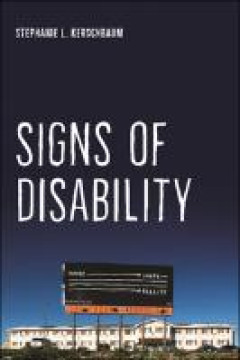
E-book Signs of Disability
How can we learn to notice the signs of disability? We see indications of disability everywhere: yellow diamond-shaped “deaf person in area” road signs, the telltale shapes of hearing aids, or white-tipped canes sweeping across footpaths. But even though the signs are ubiquitous, Stephanie L. Kerschbaum argues that disability may still not be perceived due to a process she terms “dis-atte…
- Edisi
- -
- ISBN/ISSN
- 9781479811175
- Deskripsi Fisik
- 247 halaman
- Judul Seri
- -
- No. Panggil
- 362.2 KER s
E-book Introduction to Public Health
This e-book contains information about introduction to public health.
- Edisi
- -
- ISBN/ISSN
- -
- Deskripsi Fisik
- 52 hlm
- Judul Seri
- -
- No. Panggil
- 362.12 CDC i
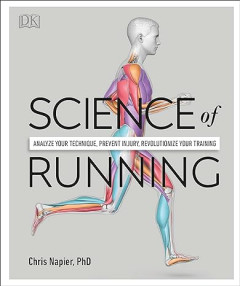
E-book Science of Running: Analyze your Technique, Prevent Injury, Revolution…
There is a science to running, and now you can learn about it too! Whether you are new to running, or have conquered a few marathons in your time, this runner's guide will show you how to train efficiently, find a suitable running regime, and master the art of running for life!
- Edisi
- -
- ISBN/ISSN
- 9780241394519
- Deskripsi Fisik
- 224 halaman, ilus.
- Judul Seri
- -
- No. Panggil
- 796.01 NAP s
E-book Strange Blood : The Rise and Fall of Lamb Blood Transfusion in 19th Ce…
The experience of a small-town German doctor would, in the mid-1870s, starta formidable transfusion craze. Oscar Hasse of Nordhausen am Harz triedtransfusion with lamb blood on fifteen patients, reported positive results inmeetings and publications, and suddenly hundreds of lamb blood transfu-sions were made in clinics, hospitals and lunatic asylums across Europe andthe USA. ‘The blood of lam…
- Edisi
- -
- ISBN/ISSN
- 9783839451632
- Deskripsi Fisik
- 217 hlm
- Judul Seri
- -
- No. Panggil
- 610 BER s
E-book Afterwar: Healing the Moral Wounds of Our Soldiers
Movies like American Sniper and The Hurt Locker hint at the inner scars our soldiers incur during service in a war zone. The moral dimensions of their psychological injuries - guilt, shame, feeling responsible for doing wrong or being wronged - elude conventional treatment. Georgetown philosophy professor Nancy Sherman turns her focus to these moral injuries in Afterwar. She argues that psychol…
- Edisi
- -
- ISBN/ISSN
- 9780199322527
- Deskripsi Fisik
- 257 halaman
- Judul Seri
- -
- No. Panggil
- 616.85 SHE a
E-book Navigating the Cultures of Health Care and Health Insurance : Highly s…
This book aims to challenge this assumption by analysing the experiences and expectations of foreign-born skilled professionals with the US health care and health insurance systems, focusing on structural and functional discrepancies within health care and health insurance. In the framework of an ethnographic study based in Washington, DC, a highly modern, international metro…
- Edisi
- -
- ISBN/ISSN
- 9781800083646
- Deskripsi Fisik
- 216 hlm
- Judul Seri
- -
- No. Panggil
- 362.12 ZEL n
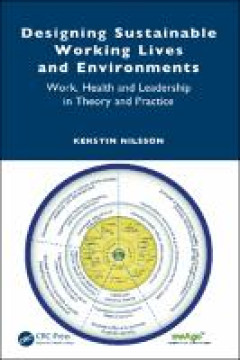
E- book Designing Sustainable Working Lives and Environments
Work is central to people’s lives and the course of their life. The opportunities and chances an individual can have in their life are significantly connected to work. Individuals' work is also crucial for organisations, companies and for the whole of society. There is a constant need to make changes and readjustments of working life since these can deeply affect the individual and their empl…
- Edisi
- -
- ISBN/ISSN
- 9781040006016
- Deskripsi Fisik
- 335 halaman
- Judul Seri
- -
- No. Panggil
- 301 NIL d
E-book Animal Magic : The Benefits of Being Around and Caring for Animals Acr…
Animal Magic highlights the ways many people get the most out of life by being around or caring for animals and pets. However, not everyone enjoys being around animals and people’s individual choices should always be understood and respected. Animal Magic gives examples of animals enhancing the quality of life of children and adults. People experiencing care have told us that being around ani…
- Edisi
- -
- ISBN/ISSN
- -
- Deskripsi Fisik
- 68 hlm
- Judul Seri
- -
- No. Panggil
- 362.12 REI a
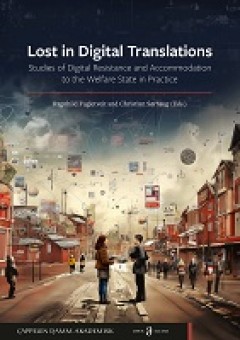
E-Book Lost in Digital Translations: Studies of Digital Resistance and Accomm…
Innovations create new possibilities for the welfare state. Digital technologies, however, can create a range of surprising and unintended effects. Lost in Digital Translations: Studies of Digital Resistance and Accommodation to the Welfare State in Practice is an exploration of what happens when digital technologies intersect with welfare state practices. This book seeks to develop a creative …
- Edisi
- -
- ISBN/ISSN
- 9788202831233
- Deskripsi Fisik
- 205 halaman
- Judul Seri
- -
- No. Panggil
- 362 BER l
E-book Disaster Management in Japan
COVID-19 infection has seen a widespread in some regions. The government has been taking measures to address this issue as an important crisis management issue, including the establishment of disaster management headquarters on March 26th, 2020. Under these circumstances, various parts of Japan in fiscal year (hereafter referred to as “FY”) of 2020 saw torrential rain, earthquakes, heavy s…
- Edisi
- -
- ISBN/ISSN
- -
- Deskripsi Fisik
- 258 hlm
- Judul Seri
- -
- No. Panggil
- 613.6 CAB d
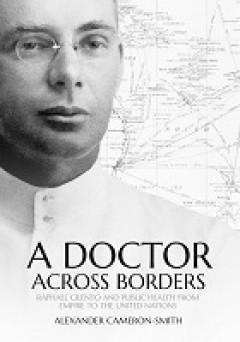
E-Book A Doctor Across Borders: Raphael Cilento and Public Health from Empire…
In his day, Raphael Cilento was one of the most prominent and controversial figures in Australian medicine. As a senior medical officer in the Commonwealth and Queensland governments, he was an active participant in public health reform during the inter-war years and is best known for his vocal engagement with public discourse on the relationship between hygiene, race and Australian nationhood.…
- Edisi
- -
- ISBN/ISSN
- 9781760462642
- Deskripsi Fisik
- 326 halaman
- Judul Seri
- -
- No. Panggil
- 610.734 CAM a
E-book Health for Wealth : Building a Healthier Northern Powerhouse for UK Pr…
There is a well-known productivity gap between the Northern Powerhouse and the rest of England of £4 perperson-per-hour. There is also a substantial health gap between the Northern Powerhouse and the rest of England, with average life expectancy 2 years lower in the North. Given that both health and productivity are lower in the Northern Powerhouse, the NHSA commissioned this report from six …
- Edisi
- -
- ISBN/ISSN
- -
- Deskripsi Fisik
- 44 hlm
- Judul Seri
- -
- No. Panggil
- 610.421 BAM h
E-book Health at a Glance : Europe 2022
Although the pandemic has had an impact on nearly everyone’s life, there have been particular concerns about the mental and physical health of the millions of young Europeans whose formative years have been marked by disruptions in their education and social activities. In several European countries such as Belgium, Estonia, France, Sweden and Norway, the share of young people reporting sympt…
- Edisi
- -
- ISBN/ISSN
- 9789264675155
- Deskripsi Fisik
- 219 hlm
- Judul Seri
- -
- No. Panggil
- 610.4 OEC h
E-book Global Strategy on Digital Health 2020-2025
In 2005 the World Health Assembly through its resolution WHA58.28 on eHealth urged Member States “to consider drawing up a long-term strategic plan for developing and implementing eHealth services… to develop the infrastructure for information and communication technologies for health…to promote equitable, affordable and universal access to their benefits.” Countries and stakeholders we…
- Edisi
- -
- ISBN/ISSN
- -
- Deskripsi Fisik
- 60 hlm
- Judul Seri
- -
- No. Panggil
- 610 SWA g

E-Book Health Care in the Information Society Vol. 2: From Anarchy of Transit…
In this fascinating book David Ingram traces the history of information technology and health informatics from its pioneers in the middle of the twentieth century to its latest developments. The book is distinctive in its broad scope and coverage and as the eyewitness account of an author who became the first UK professor appointed with the mission to bridge information technology with everyday…
- Edisi
- -
- ISBN/ISSN
- 9781800648036
- Deskripsi Fisik
- 624 halaman
- Judul Seri
- -
- No. Panggil
- 613.6 ING h

E-Book Health Care in the Information Society Vol 1: From Adventure of Ideas …
In this fascinating book David Ingram traces the history of information technology and health informatics from its pioneers in the middle of the twentieth century to its latest developments. The book is distinctive in its broad scope and coverage and as the eyewitness account of an author who became the first UK professor appointed with the mission to bridge information technology with everyday…
- Edisi
- -
- ISBN/ISSN
- 9781800649521
- Deskripsi Fisik
- 512 halaman
- Judul Seri
- -
- No. Panggil
- 613.6 ING h
E-book Biohacking, Bodies and Do-It-Yourself : The Cultural Politics of Hacki…
This plot, however, is not the only way in which DIY biology and the contexts of itsformation enter the narrative: genetic testing for disease and heritage and its reper-cussions – even a secret DNA test without the person’s knowledge or consent – forman important part of some of the storylines, while the Opioid Crisis, high drug pricesand a fight against ‘Big Pharma,’ as well as diff…
- Edisi
- -
- ISBN/ISSN
- 9783839460047
- Deskripsi Fisik
- 315 hlm
- Judul Seri
- -
- No. Panggil
- 613 GRE b
E-book Integrating Science and Politics for Public Health
But Virchow’s understanding of politics was very particular, as revealedin the second and less well-known part of his statement. After character-izing politics as medicine on a larger scale, Virchow went on to write,‘Medicine as a social science, as the science of human beings, has the obli-gation to point out problems and to attempt their theoretical solution;the politician, the practical …
- Edisi
- -
- ISBN/ISSN
- 9783030989859
- Deskripsi Fisik
- 350 hlm
- Judul Seri
- -
- No. Panggil
- 362.12 FAF i
E-book One-Pot Meals Cookbook : Nutrition and Food Services Healthy Teaching …
Did you know that 1 in 6 Americans will get sick from food poisoning this year? Food poisoning not only sends 128,000 Americans to the hospital each year, it can also have long-term health effects. The keys to basic food safety are cooking it to the right temperature and handling it properly. Follow these guidelines to keep you, your family, and your guests safe. For more information on these a…
- Edisi
- -
- ISBN/ISSN
- -
- Deskripsi Fisik
- 59 hlm
- Judul Seri
- -
- No. Panggil
- 641.563 VET o
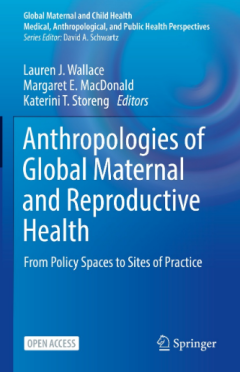
E-book Anthropologies of Global Maternal and Reproductive Health: From Policy…
This open access edited book brings together new research on the mechanisms by which maternal and reproductive health policies are formed and implemented in diverse locales around the world, from global policy spaces to sites of practice. The authors – both internationally respected anthropologists and new voices – demonstrate the value of ethnography and the utility of reproduction as a le…
- Edisi
- -
- ISBN/ISSN
- 9783030845148
- Deskripsi Fisik
- 225 hlm
- Judul Seri
- -
- No. Panggil
- 362.1 WAL a
E-book Health as a Social System : Luhmann's Theory Applied to Health Systems…
Let’s start with the basic concept, the notion of system itself. There were andstillarecountlessdefinitionsof“system”.Wedonotlistthemhereortryacom-prehensive categorization of those notions. For our purpose at this point, weonly need reflect on what a system is.That is the question: what is a system?The first answer that may come to our minds is a unit.When something iscalled a system,the…
- Edisi
- -
- ISBN/ISSN
- 9783839466933
- Deskripsi Fisik
- 199 hlm
- Judul Seri
- -
- No. Panggil
- 610 COS h
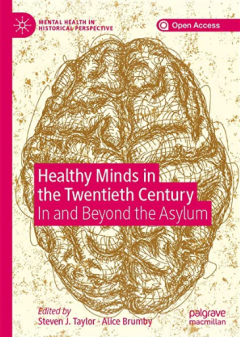
E-book Healthy Minds in the Twentieth Century : In and Beyond the Asylum
This open access edited collection contributes a new dimension to the study of mental health and psychiatry in the twentieth century. It takes the present literature beyond the ‘asylum and after’ paradigm to explore the multitude of spaces that have been permeated by concerns about mental well-being and illness. The chapters in this volume consciously attempt to break down institutional wal…
- Edisi
- -
- ISBN/ISSN
- 9783030272753
- Deskripsi Fisik
- xiii, 274 hlm. : ill.
- Judul Seri
- -
- No. Panggil
- 362.1 TAY h
E-book Hospital Care for Children : Guidelines for the Management of Common C…
Does the child’s breathing appear to be obstructed? Look at the chest wall movement, and listen to breath sounds to determine whether there is poor air movement during breathing. Stridor indicates obstruction. Is there central cyanosis? Determine whether there is bluish or purplish discoloration of the tongue and the inside of the mouth. Is the child breathing? Look and listen to determine wh…
- Edisi
- 2nd ed.
- ISBN/ISSN
- 9789241548373
- Deskripsi Fisik
- 438 hlm
- Judul Seri
- -
- No. Panggil
- 362.12 WHO h
E-book Health Promotion at School
The health of children and adolescents has, for decades, been a topic of interest in most parts of Europe. The World Health Organization (WHO) and UNESCO have sup-ported various campaigns and health programmes. The European Union (EU) and the European Commission (EC) funded several projects dealing with the promotion of health and physical activity in these …
- Edisi
- -
- ISBN/ISSN
- 9783110539592
- Deskripsi Fisik
- 163 hlm
- Judul Seri
- -
- No. Panggil
- 613.04 KNI h
E-book The Life of Breath in Literature, Culture and Medicine Classical to C…
This open access book studies breath and breathing in literature and culture and provides crucial insights into the history of medicine, health and the emotions, the foundations of beliefs concerning body, spirit and world, the connections between breath and creativity and the phenomenology of breath and breathlessness. Contributions span the classical, medieval, early modern, Romantic, Victori…
- Edisi
- -
- ISBN/ISSN
- 2634-6443
- Deskripsi Fisik
- 558 hlm
- Judul Seri
- -
- No. Panggil
- 902 ADE t
E-book Ear, Nose and Throat : The Official Handbook for Medical Students and …
Ear Nose and Throat (ENT) surgery or Otorhinolaryngology offers an exciting and varied surgical career option. It has been described as a ‘cradle to grave’ specialty with a caseload ranging from a baby with hearing loss, teenager with allergic rhinitis to an elderly man with throat cancer. As there is no separate medical companion, ENT surgeons also manage the non-surgical care of their pat…
- Edisi
- -
- ISBN/ISSN
- -
- Deskripsi Fisik
- 264 hlm
- Judul Seri
- -
- No. Panggil
- 610 DOS e
E-book Psychiatric Mental Health Nursing
In 2011, the American Psychiatric Nurses Association (APNA) and the International Society of Psychiatric-Mental Health Nurses (ISPN) appointed a joint task force to begin the review and revision of Psychiatric-Mental Health Nursing: Scope and Standards of Practice, published in 2007 by the American Nurses Association (ANA, 2007). The taskforce members were comprised of psychiatric-mental health…
- Edisi
- -
- ISBN/ISSN
- 9781558105560
- Deskripsi Fisik
- 198 hlm
- Judul Seri
- -
- No. Panggil
- 362.2 ANA p
 Karya Umum
Karya Umum  Filsafat
Filsafat  Agama
Agama  Ilmu-ilmu Sosial
Ilmu-ilmu Sosial  Bahasa
Bahasa  Ilmu-ilmu Murni
Ilmu-ilmu Murni  Ilmu-ilmu Terapan
Ilmu-ilmu Terapan  Kesenian, Hiburan, dan Olahraga
Kesenian, Hiburan, dan Olahraga  Kesusastraan
Kesusastraan  Geografi dan Sejarah
Geografi dan Sejarah